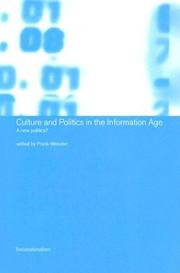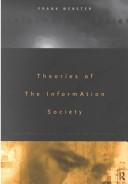| Listing 1 - 10 of 31 | << page >> |
Sort by
|

ISBN: 0415246369 0415246350 Year: 2001 Publisher: London Routledge
Abstract | Keywords | Export | Availability | Bookmark
 Loading...
Loading...Choose an application
- Reference Manager
- EndNote
- RefWorks (Direct export to RefWorks)
Social change --- Political sociology --- Computer. Automation --- Sociology of culture --- Information society --- Information technology --- Internet --- Politics and culture --- Social movements --- Société informatisée --- Technologie de l'information --- Politique et culture --- Mouvements sociaux --- Social aspects --- Political aspects --- Aspect social --- Aspect politique --- Société informatisée

ISBN: 0415282012 0415282004 Year: 2002 Publisher: New York : Routledge,
Abstract | Keywords | Export | Availability | Bookmark
 Loading...
Loading...Choose an application
- Reference Manager
- EndNote
- RefWorks (Direct export to RefWorks)
Communication --- Information policy. --- Information society. --- Information technology. --- Social aspects. --- Technological innovations. --- Information society --- Information technology --- Technologies de l'information et de la communication --- Société informatisée --- Technologie de l'information --- Social aspects --- Technological innovations --- Aspect social --- Informatiemaatschappij --- Informatietechnologie --- Postmodernisme --- Communicatie --- Sociologie --- Theorieën --- Communicatiesociologie --- Sociologische theorieën --- Communicatietheorieën --- IT --- Theorie --- Sociologische theorie --- Communicatietheorie --- Erfelijkheidsleer --- Stadssamenleving --- Verpleegkunde --- Verplegingswetenschap --- #SBIB:309H1720 --- #SBIB:309H1016 --- Informatiekunde, informatie management --- Media: socio-culturele aspecten (massamedia en maatschappij, met inbegrip van cultuurhistorische werken en werken over de maatschappelijke en politieke effecten van de (diverse) media)
Book
ISBN: 9780415718790 9780415718783 9781315867854 9781317964926 9781317964933 Year: 2014 Publisher: London Routledge
Abstract | Keywords | Export | Availability | Bookmark
 Loading...
Loading...Choose an application
- Reference Manager
- EndNote
- RefWorks (Direct export to RefWorks)
Information is regarded as a distinguishing feature of our world. Where once economies were built on industry and conquest, we are now part of a global information economy. Pervasive media, expanding information occupations and the development of the internet convince many that living in an Information Society is the destiny of us all. Coping in an era of information flows, of virtual relationships and breakneck change poses challenges to one and all.In Theories of the Information Society Frank Webster sets out to make sense of the information explosion, taking a sceptical look at what thinkers mean when they refer to the Information Society, and critically examining the major post-war approaches to informational development. The fourth edition of this classic study brings it up to date with new research and with social and technological changes – from the ‘Twitter Revolutions’ of North Africa, to financial crises that introduced the worst recession in a life time, to the emergence of social media and blogging – and reassesses the work of key theorists in the light of these changes.More outspoken than in previous editions, Webster urges abandonment of Information Society scenarios, preferring analysis of the informatization of long-established relationships. This interdisciplinary book is essential reading for those trying to make sense of social and technological change in the post-war era. It addresses issues of central concern to students of sociology, politics, geography, communications, information science, cultural studies, computing and librarianship.
Communication --- Information policy. --- Information society. --- Information technology. --- Social aspects. --- Technological innovations. --- Information society --- Information technology --- Information policy --- Information science --- Information services and state --- Communication policy --- IT (Information technology) --- Technology --- Telematics --- Information superhighway --- Knowledge management --- Sociology --- Communication and culture --- Social aspects --- Technological innovations --- Government policy

ISBN: 0415105749 0415105730 Year: 1995 Publisher: London New York Routledge
Abstract | Keywords | Export | Availability | Bookmark
 Loading...
Loading...Choose an application
- Reference Manager
- EndNote
- RefWorks (Direct export to RefWorks)
Social change --- Mass communications --- -Information society --- Information services and state --- Information policy. --- Documentatiediensten en Staat --- Documentation [Services de ] et Etat --- Etat et services de documentation --- Staat en documentatiediensten --- State aid to information services --- State and information services --- Communication --- Information policy --- Information society --- Information technology --- #SBIB:309H1016 --- #SBIB:309H1720 --- 316.77 --- IT (Information technology) --- Technology --- Telematics --- Information superhighway --- Knowledge management --- Sociology --- 316.77 Communicatiesociologie --- Communicatiesociologie --- Information science --- Communication policy --- Communication and culture --- Social aspects --- Technological innovations --- Media: socio-culturele aspecten (massamedia en maatschappij, met inbegrip van cultuurhistorische werken en werken over de maatschappelijke en politieke effecten van de (diverse) media) --- Informatiekunde, informatie management --- Government policy --- Sociology of knowledge --- Artificial intelligence. Robotics. Simulation. Graphics --- Information society. --- Information technology. --- Social aspects. --- Technological innovations. --- Technologies de l'information et de la communication --- Société informatisée --- Technologie de l'information --- Aspect social

ISBN: 9780415406338 0415406331 0415406323 Year: 2006 Publisher: Abingdon Routledge
Abstract | Keywords | Export | Availability | Bookmark
 Loading...
Loading...Choose an application
- Reference Manager
- EndNote
- RefWorks (Direct export to RefWorks)
Informatiesamenleving --- Information policy. --- Social change --- Mass communications --- Communication --- Information society. --- Information technology. --- Social aspects. --- Technological innovations. --- Technologies de l'information et de la communication --- Société informatisée --- Technologie de l'information --- Information --- Aspect social --- Politique gouvernementale

ISBN: 0415161169 0415161150 Year: 1999 Volume: *1 Publisher: London New York Routledge
Abstract | Keywords | Export | Availability | Bookmark
 Loading...
Loading...Choose an application
- Reference Manager
- EndNote
- RefWorks (Direct export to RefWorks)
In a riveting look at today's computer technology, Robins and Webster ask the disturbing question: Is it cyber-revolution-or information capitalism? They trace the information age from the Industrial Revolution to the silicon chip and the Internet. Examining the politics of cyberspace, they show how the military has controlled the development of new technologies and why education plays a central role in government attempts to create a "knowledge society." With broad coverage of current issues, including information policy, technological innovation, education, the military, surveillance, and propaganda, 'Times of the Technoculture' is a thought-provoking revisionist account of Luddite resistance to new technologies.
Mass communications --- Sociology of culture --- Communicatie en cultuur --- Communication and culture --- Communication et culture --- Culture et communication --- Informatiemaatschappij --- Information society --- Informationsgesellschaft --- Sociedade da informação --- Société de l'information --- Société de la connaissance --- Société du savoir --- #SBIB:309H103 --- #SBIB:309H040 --- Mediatechnologie / ICT / digitale media: sociale en culturele aspecten --- Populaire cultuur algemeen --- Communication and culture. --- Information society. --- Information technology --- Social aspects. --- Social aspects --- Culture and communication --- Sociology --- Information superhighway --- Culture

ISBN: 0335199593 0335199585 Year: 1997 Publisher: Philadelphia : Open University Press,
Abstract | Keywords | Export | Availability | Bookmark
 Loading...
Loading...Choose an application
- Reference Manager
- EndNote
- RefWorks (Direct export to RefWorks)
Education, Higher --- Educational change --- Postmodernism and education --- Enseignement supérieur --- Enseignement --- Education --- Postmodernisme et éducation --- Social aspects --- Congresses --- United States --- Aspect social --- Congrès --- Réforme --- -Education, Higher --- -Educational change --- -Postmodernism and education --- -Education and postmodernism --- Change, Educational --- Education change --- Education reform --- Educational reform --- Reform, Education --- School reform --- Educational planning --- Educational innovations --- College students --- Higher education --- Postsecondary education --- Universities and colleges --- -Congresses --- Postmodernism and higher education --- Pedagogiek en onderwijskunde --- Congresses. --- moderne schoolsystemen --- -Social aspects --- moderne schoolsystemen. --- Enseignement supérieur --- Postmodernisme et éducation --- Congrès --- Réforme --- Higher education and postmodernism --- Social aspects&delete& --- United States&delete&

ISBN: 1412924073 1412924065 9781412924061 9781412924078 Year: 2006 Publisher: London Sage
Abstract | Keywords | Export | Availability | Bookmark
 Loading...
Loading...Choose an application
- Reference Manager
- EndNote
- RefWorks (Direct export to RefWorks)
Journalists Under Fire: Information War and Journalistic Practices is the first book to combine a conceptually audacious analysis of the changing nature of war with an empirically rich critical analysis of journalists who cover conflict. In this book, authors Howard Tumber and Frank Webster explore questions about Information War and journalistic practices. Frontline correspondents play a key role in Information War, but their position is considerably more ambiguous and ambivalent than in the epoch of Industrial War. They play a central role in the presentation of what is often spectacle to audiences around the world whose actual experience of war is far removed from combat. In the era of multi-national journalism, of the Internet and satellite videophone, the book highlights central features of media reporting in contemporary conflict. Drawing on over fifty lengthy interviews with frontline correspondents, the authors shed light on the motivations, fears and practices of those who work under conditions of Journalism under fire. Journalists Under Fire is designed for undergraduate and postgraduate students and for scholars, academics and researchers in the fields of Journalism, Journalism Studies, Communication, Media Studies, Sociology, Cultural Studies, International Relations and War Studies.
War --- Press coverage. --- Journalistiek --- Oorlogsjournalistiek --- Informatiemaatschappij --- Beeldvorming --- #KVHA:Journalistiek --- #KVHA:Media --- #KVHA:Oorlogsjournalistiek --- War in the press --- Embedded war correspondents --- Press coverage --- Reizen --- Ziekte --- Vliegen (werkwoord)
Book
Abstract | Keywords | Export | Availability | Bookmark
 Loading...
Loading...Choose an application
- Reference Manager
- EndNote
- RefWorks (Direct export to RefWorks)

ISBN: 1849641749 0585489572 9781849641746 9780585489575 0745319955 9780745319957 0745319947 9780745319940 Year: 2003 Publisher: London Sterling, VA Pluto Press
Abstract | Keywords | Export | Availability | Bookmark
 Loading...
Loading...Choose an application
- Reference Manager
- EndNote
- RefWorks (Direct export to RefWorks)
Privacy, Right of. --- Electronic surveillance --- Social control. --- War on Terrorism, 2001-2009. --- Global Struggle Against Violent Extremism, 2001-2009 --- Global War on Terror, 2001-2009 --- GWOT, 2001-2009 (War on Terrorism) --- Terror War, 2001-2009 --- Terrorism War, 2001-2009 --- War against Terrorism, 2001-2009 --- War on Terror, 2001-2009 --- Military history, Modern --- Terrorism --- World politics --- Afghan War, 2001 --- -Iraq War, 2003-2011 --- Operation Enduring Freedom, 2001 --- -Social conflict --- Sociology --- Liberty --- Pressure groups --- Invasion of privacy --- Privacy, Right of --- Right of privacy --- Civil rights --- Libel and slander --- Personality (Law) --- Press law --- Computer crimes --- Confidential communications --- Data protection --- Right to be forgotten --- Secrecy --- Social aspects. --- Prevention --- Law and legislation --- Afghan War, 2001-2021 --- Iraq War, 2003-2011
| Listing 1 - 10 of 31 | << page >> |
Sort by
|

 Search
Search Feedback
Feedback About UniCat
About UniCat  Help
Help News
News